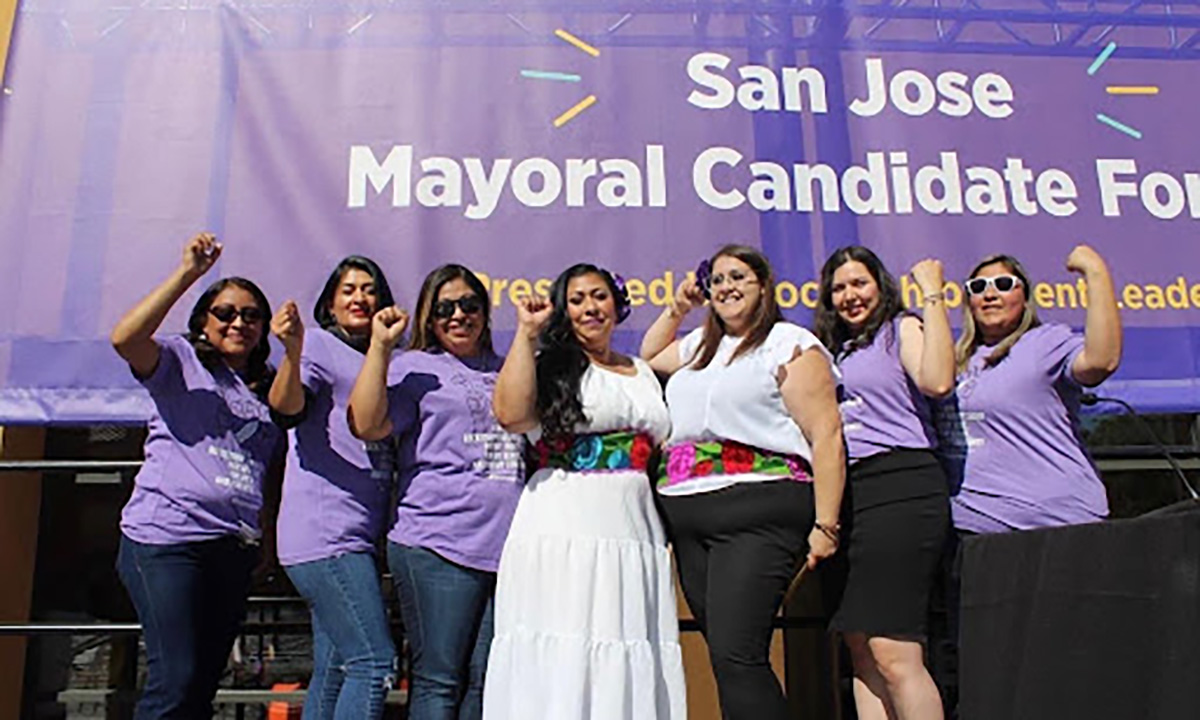Educator’s View: My Schools Are Helping Parents Become Voters. Yours Should, Too
Lambrecht: The deep, trusting relationships schools form with parents can serve as the foundation for broader civic engagement, including voting

Get stories like this delivered straight to your inbox. Sign up for The 74 Newsletter
I immigrated to America when I was 10 years old and lived with my family in the uncertainty of not having documentation for 10 years. I became a citizen in 2017, after my American grandmother petitioned for me. I still remember the day I swore my oath of citizenship. It was a cold Boston morning, and as I was leaving Faneuil Hall, the first thing I did was register to vote.
Later that fall, I voted for the first time, in a local school board election. After so many years in this country, I finally felt included, like my voice did matter. As my siblings and parents became citizens, I took the responsibility of teaching them to access their vote. Whether it was translating ballots, explaining municipal roles or sharing logistical information, such support allowed my family to confidently access their right to vote.
As a U.S. citizen who came to America in pursuit of a better life and who believes in the ideals of democracy and opportunity, I struggle to understand many of the current policies that seek to restrict voting rights, especially in my home of Texas. It seems that too many policies are meant to suppress voter rights and silence the voices of Black and brown communities. Such injustice adds urgency to the need to ensure that immigrants, communities of color and other disenfranchised groups can access their vote.
Schools have an important and unique role to play in this effort. The deep, trusting relationships schools form with parents can serve as the foundation for broader civic engagement. This can not only lead families and youth to become involved in elections, but can help shape the next generation of voting citizens by setting an example.
At Rocketship Public Schools, we view community transformation as a key pillar of having long-term impact beyond elementary school. We serve largely low-income communities of color who have traditionally been marginalized and silenced, both in schools and in civic engagement. Our community schools‘ connections with families set the stage for involvement in the nation’s democratic process. Fostering a school environment where families feel completely welcome builds a foundation of trust that empowers them to use their voices in their broader neighborhood, city and state communities.
We invest in personal relationships through annual home visits, monthly or weekly parent coffees, quarterly community meetings and an open culture that engages families as part of our school family. Even more so, Rocketship’s families are invited to lead by making decisions and taking collective action through Parent Organizing Committees and School Site Councils. Several Rocketship parents are full voting members on the network’s national board of directors.
But even with these efforts, only 18% of parents with children attending Rocketship are registered to vote. As a public school network, we believe it is our responsibility to not only teach our students about the bedrock of our democracy, but also engage their parents to ensure they are exercising their rights as citizens.
So, this fall, for the second year, Rocketship is leading a coordinated effort across our 22 schools to register families to vote and drive voter mobilization in Nashville, Milwaukee, Fort Worth, the San Francisco Bay Area and Washington, D.C. This will include family sessions to learn about the right to vote, communications campaigns about election logistics, one-on-one conversations to answer questions and a student curriculum about what voting means in America’s democracy, with a home-to-school connection to encourage families to have conversations about voting at the dinner table.
We will work individually and in small groups to make sure everyone knows how to access their vote: the requirements for registering, relevant deadlines, voter registration forms, polling locations and more. We also have Rocketship parent leaders in California and Texas hosting large candidate forums so parents can directly ask those running for office questions about their platforms.
Nearly half of Rocketship’s families are not native English speakers. Language is often one of the major barriers that prevents citizens from exercising their right to vote. That is why we provide written translation of materials, have interpreters at our in-person sessions and employ multilingual staff to answer families’ questions. We also think it is important for families to understand the history of voter inequity in this country and how that impacts access to the democratic process. Just like with our students, we know that if we engage parents in understanding the broader context for why voting rights are critical and why people have fought to protect them, they will become more involved.
Rocketship will not endorse any candidates or issues; we are simply helping families exercise their right to vote. In this way, we hope to increase the percentage of parents who show up to the polls this fall and have a long-term impact on our students who are watching.
Our network strives to live our values of community and inclusion for students and families in hopes of impacting communities beyond running excellent elementary schools. I hope other schools across the country choose to civically engage their communities and take a stand to model and protect democracy in this country.
Get stories like these delivered straight to your inbox. Sign up for The 74 Newsletter

;)
